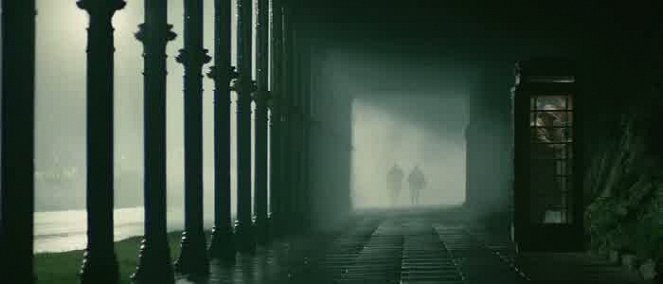Réalisation:
Rowan JoffeScénario:
Rowan JoffePhotographie:
John MathiesonActeurs·trices:
Helen Mirren, John Hurt, Andy Serkis, Sam Riley, Andrea Riseborough, Sean Harris, Nonso Anozie, Steven Robertson, Steve Evets, Geoff Bell (plus)Résumés(1)
Brighton 1964. Pinkie Brown, redoutable petite frappe de dix-sept ans, tourmenté, sexuellement inhibé et déjà mégalomane, veut venger le meurtre de son chef de gang et, par la même occasion, s'imposer comme leader. Rose, une jeune et innocente serveuse tombe sur des preuves le liant à un règlement de comptes, il décide de la séduire afin de s'assurer de son silence. Celle-ci tombe facilement sous le charme envoûtant de l'odieux assassin. (Océan Films Distribution)
(plus)Critiques (2)
The film begins with the story of a young brat, who was unlikeable from the very first second. His harlequin haircut made me sick, he has an opinion on everything and picks up a girl with phrases like: “I know what you want. You’re good and I’m bad. We’re made for each other.” Of course, the girl is stupid, and he gets away with it. I also have something to say about that girl. I haven’t seen such a dumb girl in a really long time. The final scene is really desperately stupid. Well, what can I say, when these two are the main characters in this pseudo-romantic crime story? I really never want to see this movie again.
()
Brighton Rock is receiving mixed comments and low ratings, which is to some extent due to the absence of characters with whom the viewer can identify and cheer for. But only to some extent, because the strangest feeling of anachronism has the biggest influence. The screenplay is strangely stuck deep in the past. The film realistically takes place in the early 1960s during the era of mods, but it feels like a movie filmed in the mid-1940s based on a screenplay that had been sitting in a drawer for a few years and portrays a society a decade older. Above all, the main character Rose with her boundless naivety does not fit into the 60s, but rather into the pre-war era. The brutality and malevolence of the main villain could have shocked audiences in the 40s, but today we are used to much more radical personalities and actions. Even the pace of the film's storytelling is different now. I'm just speculating, but it seems quite logical to me that the creators adhered too slavishly to the original film from 1947 (which I have not had the opportunity to see yet) and the book on which the film is based. We have moved on and the thinking of these characters is now too distant for us. If this had been directed by, say, Hitchcock in the 40s, it would be a respected classic in the same form, but like this, most viewers just will just shrug and move on. Personally, I can say that Rowan Joffe, as the director, earned a weak 3 stars from me, but just barely. Overall impression: 50%.
()

